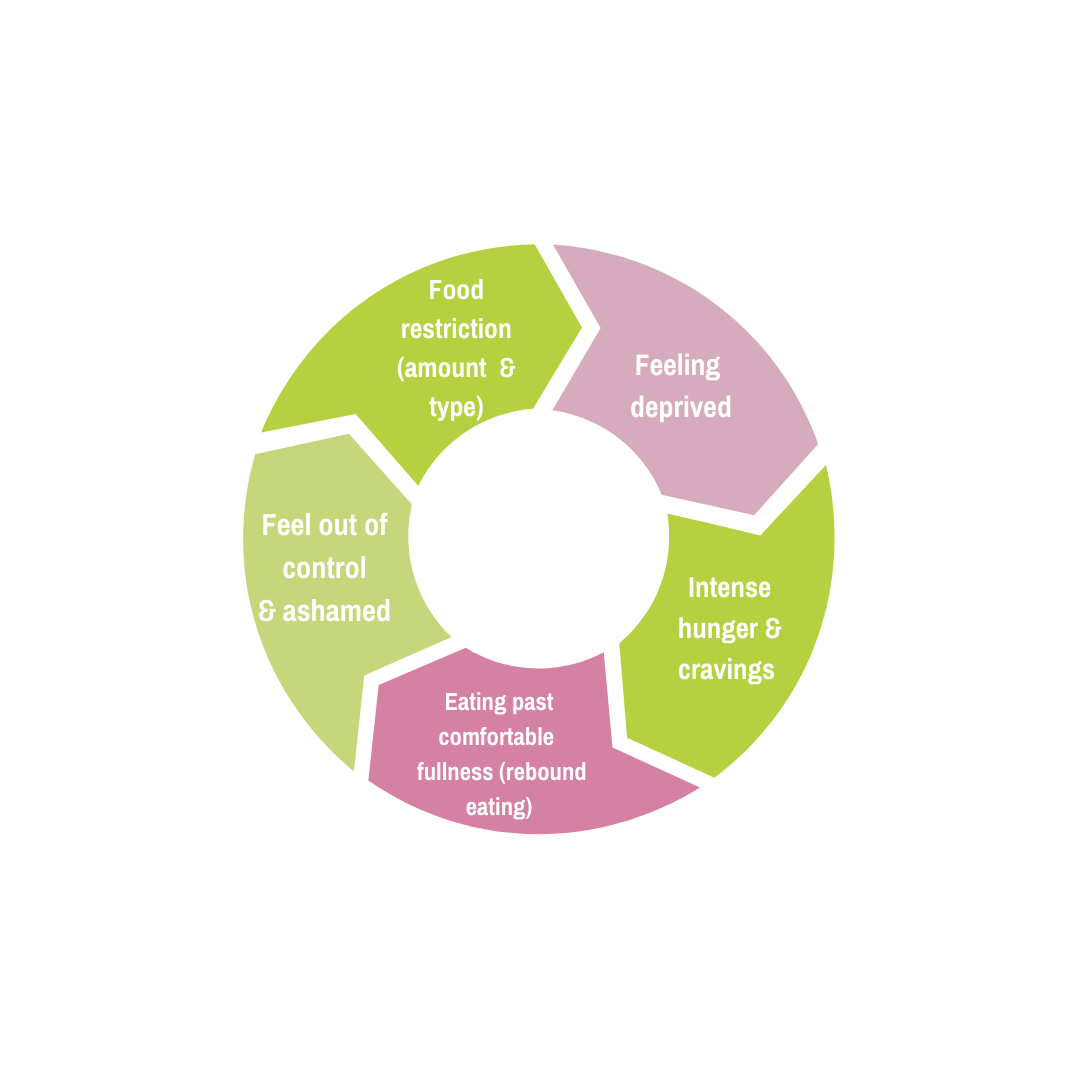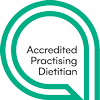Making peace with food
This is the third post in a 10-part series looking at the principles of Intuitive Eating. The previous post was on Honour your hunger.
Principle 3 – Make peace with food – is about giving yourself unconditional permission to eat. If you are new to Intuitive Eating, this is a concept you might be finding difficult – perhaps even frightening. If that’s the case, you will likely find this post helpful!
Depriving yourself of food sets you up for rebound eating
Most likely you’ve heard the expression, “forbidden fruit” used to describe something that is a source of pleasure but requires breaking a rule to enjoy it? It’s a term that can be applied to many things – including food. If, for example, you enjoy eating certain foods such as bread, cake, chips or any other food for that matter, but tell yourself you aren’t allowed to have them (because of food rules or beliefs you have) these foods become “forbidden fruit”.
Forbidding yourself a certain food is a form of psychological deprivation. And if you’ve dieted or banned certain foods with the goal of weight loss or weight maintenance, you’ve experienced psychological deprivation. If you read my previous post on Honour your hunger, you will remember how primal hunger can lead to eating that feels out of control. Well, a similar thing can happen with psychological deprivation – even if you are honouring your hunger and not experiencing primal hunger.
Here’s why. The moment you forbid yourself a food, you start to crave it. The longer you deprive yourself, the stronger the cravings grow. Eventually the cravings become so strong that it leads to bingeing on that food and eating past comfortable fullness. In Intuitive Eating, this is known as “rebound eating” (see the graphic below). Keeping foods off-limits or “forbidden” sets you up to crave larger quantities of that food.
Some different types of rebound eating
Simply perceiving that food might become off-limits, can trigger eating to the point of feeling uncomfortably full. A typical example is when you decide to start a diet or food plan with forbidden foods on Monday and then eat past comfortable fullness in the days leading up to starting the diet – a kind of “farewell to food” feast. Research supports this phenomenon. A 2015 study found that telling a group of chocolate lovers they were not allowed to eat chocolate for 3 weeks, triggered an increase in the amount of chocolate they ate both before and after the chocolate restriction. In another study, a group of children were told they could eat as many yellow M & M chocolate candies as they wanted, but the red ones were off-limits. Guess which colour M & Ms got eaten the most? The red ones!
“Food competition” is another more subtle example of rebound eating. People who grew up in a large family where there was always competition for food at the dinner table often experience this kind of future food deprivation worry. As children they worried, they wouldn’t have enough to eat, even when there was enough to go around. So as to not miss out, they learnt to grab as much food as quickly as they could which often meant eating past comfortable fullness. As adults, they continue eating past the point of comfortable fullness.
And another example is “the empty cupboard” where shopping is chaotic and there is often no food in the house. As a consequence, eating alternates between feast (when food is available) and famine (when it’s not). When food is in the house, it takes on a kind of special significance.
The key to preventing rebound eating
The key to stopping the cycle of food restriction and subsequent rebound eating is giving yourself unconditional permission to eat all foods. When you truly give yourself unconditional permission to eat, you eliminate the urgency to overeat because you know you can always have a (previously-restricted) food whenever you want.
What is giving yourself unconditional permission to eat?
Giving yourself unconditional permission to eat all foods you enjoy eating means ditching the idea that certain foods are “good” and other foods are “bad”. This means that, for example, choosing an apple becomes emotionally and morally equivalent to choosing some M & Ms. Clearly an apple and M & Ms are not nutritionally equal, but they are emotionally and morally equal because food has no moral value. You are not “good” if you choose the apple. And you are not “bad” if you choose the M & Ms. Giving yourself unconditional permission to eat is not “just” allowing yourself to eat previously restricted foods, it’s also about truly believing that your food choices do not reflect your moral character -that is, you are not a “good” or “bad” person based on what you eat.
Be careful about giving yourself pseudo-permission, which happens when you put conditions on that permission. Pseudo-permission can look like:
- “I can eat this piece of cake, if I eat less at dinner.”
- “I can eat these chips if I squeeze in some extra exercise tomorrow.”
In both cases the permission is conditional, not unconditional. Truly making peace with food means allowing all the foods you like to eat without any conditions attached to doing so.
Although it might sound relatively straight forward, making peace with food is much more complicated than simply deciding on and eating a previously forbidden food and many people benefit from some additional support with this step.
Why giving yourself unconditional permission to eat “works”.
A very common and reasonable concern with Intuitive Eating is that if you give yourself unconditional permission to eat, you will lose control and never stop eating.
But what does science say? The science tells us that eating past comfortable fullness is often the result of food restriction and that over time unconditional permission to eat all foods actually leads to decreased feelings of deprivation and to foods that were previously restricted becoming less exciting and thrilling (through a process called habituation).
Habituation is what happens when you’re exposed to the same stimulus repeatedly and the novelty starts to wear off. You can experience habituation with food too. Imagine you prepare a tasty meal and you eat leftovers from the meal several days in a row. Are you likely to enjoy the meal as much a few days later as you did the day you prepared it? Probably not. Habituation studies show that the more often you’re exposed to a food, the less exciting it becomes. Explained in the context of forbidden foods: Once a food loses its taboo quality and you truly don’t feel deprived of it anymore, it loses its special appeal and isn’t any more exciting than other foods. When foods are off-limits or “forbidden”, they stay novel and exciting because habituation is prevented from occurring.
Fears that can prevent you from making peace with food
Making peace with food is an unsettling process for many clients, and is often more frightening than the idea of giving up dieting. Three common fears that can prevent you from truly making peace with food are:
I won’t stop eating
The reality is that once habituation occurs, you won’t feel the urgency to eat a previously-restricted food, because you know you can always eat this food when you want to. Eating past comfortable fullness is the result of no/low habituation plus the fear of deprivation (food restriction/dieting).
I won’t eat healthily
It’s helpful and necessary to put nutrition to one side when you are learning to become an intuitive eater so that you are free to notice and respond to your body’s cues and how a food tastes and feels in your body without being distracted by thoughts about the nutritional properties of a food. Rest assured, over time, your choices will balance out to include mostly nutritious foods. Research shows that intuitive eaters tend to eat a more nutritious, varied diet than people who eat based on external dieting rules. A January 2021 study found that Intuitive Eating was associated with higher fruit and vegetable intake among adults. In addition, Intuitive Eating was not associated with a higher intake of lower-nutrient, energy-dense foods.
I’ve already tried this and it didn’t work
Some clients report “allowing” themselves to eat foods that were previously forbidden but still eating past comfortable fullness and feeling out of control around that food. This tends to occur when you give yourself pseudo-permission and not unconditional permission. You eat the food, but it’s still accompanied by feeling guilty and thoughts of compensating like “eating better” (i.e. future food deprivation) the next day. It “didn’t work” because pseudo-permission, not unconditional permission was given.
Intuitive Eating is not eating whatever you want, as much as you want, whenever you want
One big misconception about Intuitive Eating – that relates to giving yourself unconditional permission to eat – is that it’s about eating whatever you want and as much as you want whenever you feel like it. While Intuitive Eating includes giving yourself unconditional permission to eat, it’s not just about that. It’s also about paying attention to your body’s hunger and fullness cues, getting curious about what foods you find satisfying and much, much more.
Some questions that tap into the other principles of Intuitive Eating that can be helpful to reflect on when giving yourself unconditional permission to eat are:
- How hungry am I? (Principle 2, Honour your hunger).
- Are there any negative thoughts coming up for me when I eat certain foods and if so, how can I challenge them? (Principle 4, Challenge the inner food critic).
- Will this food satisfy me? (Principle 5, Discover the Satisfaction Factor).
- Is the food still tasting good now that I’m halfway through eating it? (Principle 5, Discover the Satisfaction Factor).
- Am I starting to feel comfortably full? (Principle 6 Feel your fullness).
- Now that I’ve finished eating, how do I feel physically? (Principle 6 Feel your fullness).
What is true is that there’s often a “honeymoon” phase at the beginning of your Intuitive Eating journey when you eat more of whatever foods you haven’t been allowing yourself for a period of time (ice cream, chips, chocolate etc). This is a normal reaction to restricting these foods. It’s helpful to think of this phase as your body overcorrecting for the physical and/or mental food restriction you’ve been experiencing. You can liken it to a pendulum: when a pendulum is pulled back one direction (food restriction), it will swing in the other direction when you let go (the “honeymoon phase”).
Eventually, once you have given yourself time and unconditional permission along with reconnecting with your body and its hunger and fullness cues (called attunement) and paying attention to foods you find satisfying, the pendulum stops swinging and comes to rest in the middle. You can imagine this as arriving at a more peaceful place where you may want a certain food from time to time, but not in a way that feels urgent and out of control.
Short and sweet
Not allowing yourself to eat and enjoy certain foods sets you up for rebound eating. While it’s common to feel that if you don’t have food rules, your eating will be totally out of control, it’s really the food rules and restrictions that eventually lead to feeling out of control with food and rebound eating. The key to stopping the cycle of food restriction and subsequent rebound eating is giving yourself unconditional permission to eat all foods.
Ready to take the next step? Contact me and request a complimentary call to find out more about Intuitive Eating and how it can help you truly nourish yourself – body, mind and soul.






